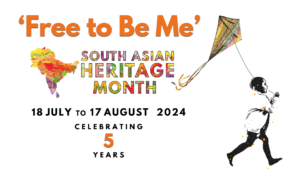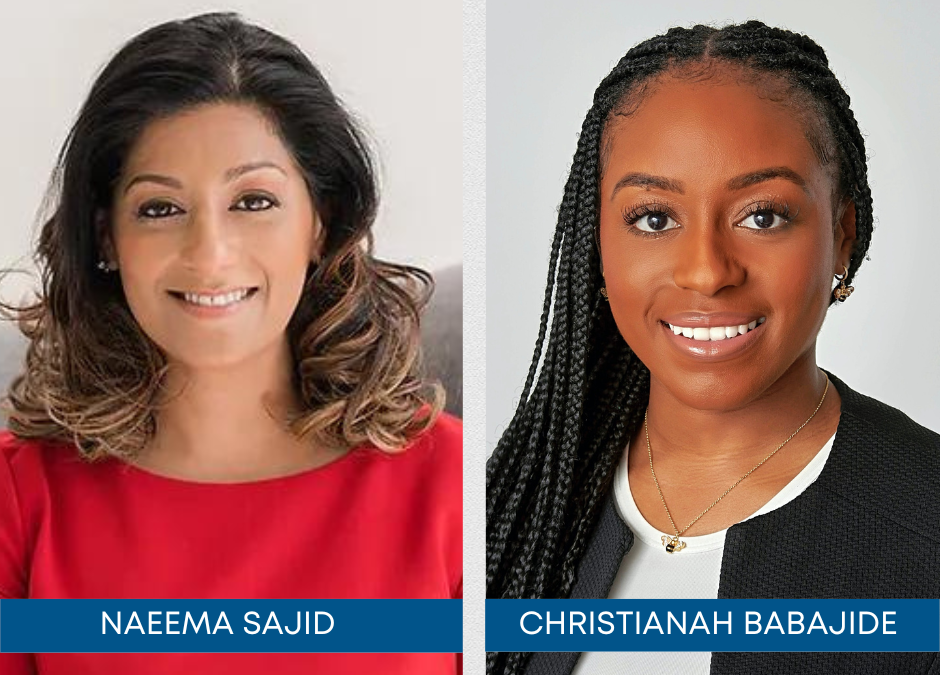
The Future Lawyer Weekly Briefing – W/C 12th August 2024
August 11, 2024
Stopping Young People Committing Crime
August 13, 2024By Christianah Ombosola Babajide.
Reading time: six minutes

COB: For South Asian Heritage Month (SAHM) 2024, I’m thrilled to be in conversation with Naeema Yaqoob Sajid (NYS), founder of Diversity+, a bespoke consultancy firm designed to assist organisations make improvements in their diversity and inclusion footprint. Naeema, thank you for joining us today.
NYS: Thank you for having me, Christianah.
COB: Can you start off by telling us about your journey into the legal profession
NYS: I think it’s important to tell you a little about my upbringing and heritage first as it will help to put things into context.
I am a Pakistani Muslim. My parents are first generation immigrants. They came to the UK from Pakistan in the 1960s, moving to Scotland in the mid-70s when I was about five years old. There weren’t many Pakistani Muslims in Scotland then. I have a vivid childhood memory of being in the city centre with my mum, and her stopping another Asian woman, not known to her, to strike up a conversation in her native tongue. That evening she told my father with such excitement, which made me realise just how unusual that was for her and how much she missed home.
I grew up in a very impoverished council estate. I attended state schools for both primary and secondary education. I am one of eight girls which came with its challenges for my parents, as there is a certain stigma attached to having only girls in the Asian culture. I think, in part, this strengthened my parents’ resolve in supporting our education and future careers; their daughters were as good as any son.
I left school at the age of 17 to get married. I performed poorly at school. I didn’t get the best of guidance nor inspiration from teachers – I was told to study home economics and learn to type, as I’d most likely be a stay-at-home mother or secretary. But, equally, I accept I also lacked personal motivation and confidence in my abilities.
Within a few weeks of being married and experiencing what the other women in my husband’s family did, i.e.stayed at home or helped out in the family business, I felt that wasn’t for me. Even at that age I valued my independence, both in terms of my finances but also from a social and cultural point of view.
Therefore, studying law wasn’t really a conscious decision for me; I fell into it as a better alternative to the path I saw before me. Not having the grades to go to university, I went to college where I did an SNC in business studies, followed by an HND in legal studies. I had my first child whilst doing the HND and I could have stopped there. But I decided to try for university.
My college qualifications were inadequate to gain entry, therefore I had to re-sit five Highers (Scottish equivalent of A levels) before I got accepted. My journey is likely to have been less conventional than many others.
COB: Did you face any barriers along the way?
NYS: Sadly, I did. As a woman, as a woman of colour, as a woman of colour with children, as a woman of colour with religious beliefs and cultural expectations. Layer upon layer of intersectional barriers – both my own and that of others. But I learned to navigate them to better embrace opportunities and fight challenges when they came my way. I had to, if I wanted to advance my career, which I was determined to do. For me, the most cohesive and despondent barrier was being allowed onto the ‘table of power’ while receiving the message you are there to be seen, not heard. So often, despite being so obviously visible in the room, I felt invisible and a ‘surplus’. Looking back from where I am now, and the work I do, makes me realise how hopeless a situation that was. Such lost opportunities for everyone, including me.
COB: What inspired you to found Diversity+?
NYS: I set up Diversity+ to help fill what I saw as a huge gap of knowledge and lived experience in Scotland. I was frustrated at referring my friends and colleagues to organisations who had no knowledge of the Scottish legal sector, and no lived experience of the challenges those from under-represented backgrounds faced. Most of these organisations were in England with experience of the English legal sector and demographics. This didn’t sit well with me – after all, we have very different demographics, needs and skills gaps for which we need Scottish solutions, hence Diversity+ came to being created: diverse solutions for Scotland’s unique needs.
COB: In what ways do you think the legal profession can become more inclusive?
NYS: There is certainly a lot more talk and awareness about EDI (equity, diversity and inclusion) and many initiatives to help remove intentional and unintentional barriers, such as blind recruitment, but we can be clumsy and short-sighted with our approach. To be truly inclusive i.e to introduce, retain and advance diverse talent – you really must address barriers at every stage. It is like a chain and if one link breaks it has a direct effect on the next link. Without a diverse mindset – i.e. believing in and nurturing diverse talent – that talent will not flourish and is held back from progressing. Without a genuinely inclusive workplace culture – i.e. regardless of your background and personal identity you are seen and heard by leadership – your diverse talent will not advance into senior roles. To become and remain inclusive, leaders need to see and believe in the bigger picture.
COB: How can initiatives like SAHM contribute to diversity and inclusion in the legal profession?
NYS: It is an opportunity to help expand friends, colleagues and business leader’s cultural intelligence by sharing knowledge of South Asian culture and heritage. It is a part of us and, personally, for too long I hid or rejected it in an effort to fit in. I’m a product of 1970’s Britain when the push was to integrate as opposed to belong in. I read a post on LinkedIn that said ‘South Asians being silent about their heritage 11 months out of the year, but come SAHM, they’re the loudest voice in the room’. It made me reflect and reconsider writing this article. But then my inner voice, developed from the wise words from my parents, made me rethink. If we have the knowledge and the privilege of having a platform via which colleagues and supporters reach out to us wanting to hear what we have to say, should we not use it in our own little way to advance the case for better inclusion? Is this not what we fought and struggled to achieve? Surely the aim is to bring down barriers, not reinforce the existing ones, or worse, create new ones? If anything, the recent riots have shown us what misinformation and ignorance can lead to.
COB: What does this year’s theme ‘free to be me’ mean to you?
NYS: To me, it means we don’t all need to be in a ‘box’ to fit in. We don’t all need to be the same. After all there is only one of me. What’s important is to be our true selves and for others to embrace us as that. A huge part of that process is having honest, respectful but sometimes uncomfortable conversations, both on our part and on the part of those that wish to learn more about us.
Quick fire questions:
COB: One piece of advice for aspiring lawyers?
NYS: Seek out a mentor. Someone who will inspire and guide you, and most importantly, support you through the challenging times. It’s a tough, competitive profession and having emotional support is more essential now than ever. The increasing burn out rate of our early talent is something that should concern us all.
COB: Favourite legal TV show?
NYS: I’d have to confess to not having watched Ally McBeal or LA Law like many of my contemporaries (study, work and family life is a tricky balance!). More recently however I did enjoy watching ‘The Split’.
COB: Dream holiday destination?
NYS: If I could go back in time, I’d love to visit pre-partition India and see my diverse cultural ancestors (Muslim, Hindi and Sikh) living and working together side by side. While we have our differences there is so much to celebrate about our shared heritage.
Read more about SAHM:
- Vridhi Mathur analyses the progress of south Asian lawyers so far: https://thestudentlawyer.com/2024/07/04/the-progress-of-south-asian-lawyers-so-far/
- Isha Amir explores the impact of this rich heritage on diversity and inclusion within the legal profession: https://thestudentlawyer.com/2024/07/01/south-asian-heritage-month-2024-the-impact-on-diversity-and-inclusion/
- Josmi Saji writes about the importance of celebrating the vibrant cultures, traditions, and contributions of South Asian communities: https://thestudentlawyer.com/2024/07/01/celebrating-south-asian-heritage-month-2024/
- Aayla Qureshi sheds light on the importance of exploring cultural diversity in law during South Asian Heritage Month: https://thestudentlawyer.com/2024/07/04/exploring-cultural-diversity-in-the-legal-profession/
- Trisha Vadher shares what South Asian Heritage Month means to her: https://thestudentlawyer.com/2024/07/01/south-asian-heritage-month-my-big-fat-identity-crisis-2/





